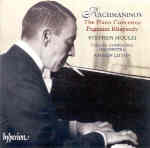This multichannel release raises disturbing questions about the wisdom of issuing discs in a dual format. Having first heard the stereo-only version and acclaimed it as the finest Rachmaninov concerto cycle currently available, something easily confirmed in listening to the stereo layer on this SACD set, multichannel playback sounds so different, and so signally fails to project some of the qualities that are vividly audible in normal stereo, that there’s a real issue of what the engineer’s responsibilities are in capturing a performance for home listening. In other words, should he try to make the performers sound as good as they can under what he may assume (for serious music lovers) will be decent if not exceptional domestic conditions, or should he try to capture the “natural” acoustic of the hall even if this robs the interpretation of much of its color and impact when heard at home? And which perspective, if either, actually represents the artist’s intentions? In today’s market, do we really need to further complicate things in this manner?
Let me be very specific. This multichannel recording (4.0, a fact that should be disclosed up front) places the listener in a somewhat distant balcony seat. I don’t know where the microphones were, but this is how it strikes me. There’s plenty of room acoustic, but this has the result of creating an excess of reverberation that lessens the impact of the orchestra, and more significantly, makes Hough’s contributions sound small-scale and lacking in the coloristic variety that comes across so vividly in regular stereo. The wonderfully pointed interactions between the soloist and orchestra that are such a joy in these performances also lose some of their character in this more homogenized sonic frame. In addition, in the four concertos (which were recorded live), the rear channels capture numerous small audience noises that were previously inaudible, adding an additional level of realism, or distraction, depending on your tolerance for such things. My tolerance is pretty high, most of the time, except that I don’t see any reason to put up with it in multichannel playback when I don’t have to in normal stereo.
The advantage to the SACD, of course, is that listeners can choose the sound that they prefer, but to be truthful I don’t think that adding yet another level of choice to the equation is necessarily a good thing. If I had been required to assess these performances based solely on the impression they make in multichannel format, there’s no question that I would have found Hough’s contribution less impressive simply because you can’t hear it as well. Does that invalidate my initial impression? Not at all: I don’t care what the artists and engineers have to do in order to create a result that strikes me as musically fabulous, and in stereo that’s exactly what we have. I just can’t help but wonder, however, if in seeking to capture the “realism” that the multichannel format promises, we don’t risk throwing the baby out with the bath water, and letting generalized considerations of sonic naturalism make us forget what really matters: namely, technology placed entirely in the service of the artists, which captures, supports, and enhances their interpretive goals.
































